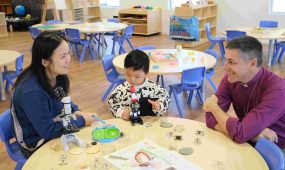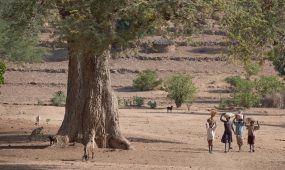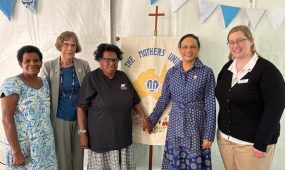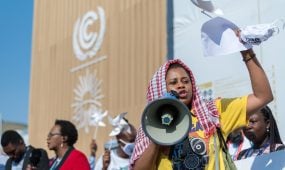Salt of the Earth group draws young Christians together in West Bank
News
Osama Sayegh has a heart for numbers: four in Deir Ghazaleh, 35 in Kufr Kad, 50 in Toubas, 35 in Jalameh, 67 in Burqin, 130 in Jenin. He counts the number of Christians left in these communities across the northern part of the West Bank
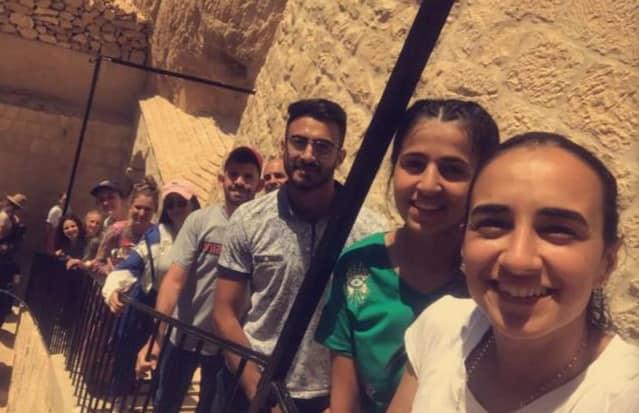
Osama Sayegh has a heart for numbers: four in Deir Ghazaleh, 35 in Kufr Kad, 50 in Toubas, 35 in Jalameh, 67 in Burqin, 130 in Jenin.
He counts the number of Christians left in these communities across the northern part of the West Bank. He reaches with his heart for the people behind those numbers: why are young Christian families leaving? How can he convince them to stay?
Sayegh believes that drawing them together, uniting them, and keeping hope alive will make a difference, not just for these families but for all of Christianity.
The 48-year-old husband and father of two is the founder of Salt of the Earth, an organization that offers resources, support, and activities for Christians who remain in small villages in the northern part of the West Bank.
Around the world, “many people don’t know that Christianity exists in the village on Burqin where I live,” said Sayegh, despite that fact that the Church of St George, a Greek Orthodox church located in Burqin, is believed to be one of the oldest churches in the world.
Sayegh thinks it’s time to stem the tide of diminishing numbers. “About four-and-a-half years ago, I started thinking that we as Christians must come together and start taking action,” he said.
“We only started with an idea to try to do something good for young women and men in that area.”
The first meeting of what became Salt of the Earth was held in the Latin monastery in Jenin.
Advertisement
“Thirty young men and women, who I thought were leaders, I brought them together,” he recalled.
“We started brainstorming.”
They began with a simple approach: encouraging children to pray and go to church.
“We had children in the village who didn’t know how to pray,” said Sayegh.
“The idea kept growing, and we wanted to make sure we kept things lively and energetic, so that the little children would not feel bored and would continue to come to church.”
They soon started a scouts group and a cultural dance group, “and this really became the sort of encouragement for the young boys and girls to start participating because we were doing something fun and useful,” said Sayegh.
Salt of the Earth also continues having weekly meetings, offers Bible studies, coordinates work with mothers, runs summer camps for kids, and organizes Easter and Christmas celebrations.
“We also visit a home for the elderly where Christians and Muslims are living, and we do good work with people with special needs,” said Sayegh.
Advertisement
“We believe this is our role as Christians and we continue to be true to our name.”
Bringing people together from six villages is challenging, Sayegh admitted.
“But we are persevering and we are always determined,” he said.
“We have 80 people from the six villages including parents, youth, and little children.”
The numbers are growing—and so is the hope.
Sayegh works as a security officer for the Palestinian Authority; he has been in government service for 27 years.
“I love youth work, and when I told my managers, I asked them for time to do this work in my community. They supported the idea.”
When Salt of the Earth began, Sayegh had doubts about it continuing.
“I never imagined I was going to succeed and continue for this long,” he said.
“My energy is really enshrined in my strong desire to do something for the Christian youth who are abandoned here,” he said.
“Everything that I had in my mind—I did it.”
Sayegh asked people across the world to join him in praying that Christianity remains in the Holy Land.
“Pray that Christianity will stay put,” he said, “because we are in tremendous danger.”
For reflection: This is the story of one person, driven with faith and love, who seeks to help local small communities survive hardship and help them remain steadfast in their original lands. His first instinct was that, through bringing these remote and separate communities together, he will help them feel belonging to one another and, from there, stems hope and strength to endure the challenges around them. Together with the group he helped establish, he also brought marginalized children closer to church using creative activities—a success story of resilience and active hope.
World Week for Peace in Palestine and Israel
First published on the World Council of Churches website on 20 July 2022.

